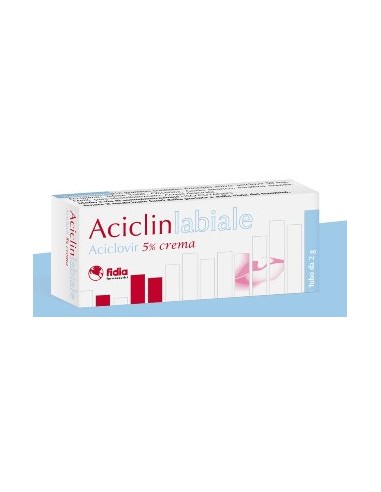Your cart
There are no more items in your cart
Over-the-counter drugs Aciclinlabial cream 2g 5% Aciclin
 100% secure payments
100% secure payments





ACICLINLABICS 50 MG/G CREMA
active ingredients
A gram of cream contains 50 mg of Aciclovir. Excipient with known effects: methyl–para–hydroxy–benzoate. For the full list of excipients, see paragraph 6.1Excellent
Tefose 1500, Glycerin, Stearic Acid, Liquid Paraffin, Metil–para–hydroxybenzoate, Purified WaterTherapeutic indications
ACICLINLABIALE is indicated in the treatment of herpes simplex lip virus infections (recurring herpes Iabialis) in adults and adolescents (aged over 12 years).Contraindications
ACICLINLABIALE is contraindicated in patients with hypersensitivity to the active ingredient, valacilovir, propylene glycol or any of the excipients listed in the paragraph 6.1. Children under 12 years of age.Population
Population Adults and teenagers (aged 12 years) ACICLINLABIALE must be applied 5 times a day at intervals of about 4 hours, omitting the night application. ACICLINLABIALE must be applied to injuries or areas where they are developing as early as possible after the infection begins. It is particularly important to begin the treatment of recurring episodes during the prodromi stage or the first appearance of injuries. The treatment must continue for at least 5 days and up to a maximum of 10 if you did not have healing. Patients must wash their hands before and after the application of the cream and avoid unnecessarily rubbing the lesions or touching them with a towel in order to avoid worsening or transmitting the infection. Pediatric population The safety and effectiveness of ACICLINLABIALE in children under the age of 12 have not yet been established.Conservation
Do not store at temperature above 25°C. Don't refrigerate. For storage conditions after first opening see paragraph 6.3.Warnings
ACICLINLABIALE must be used only for the labial herpes present on the lips. The product is not for ophthalmic use, nor is it advisable to apply on mucous membranes of the mouth or nose, eye or vagina, since it can cause irritation. The product should not be used in the treatment of genital herpes. Special attention should be paid to avoid accidental application in the eyes. The long-term use of the product can result in awareness-raising, where this is necessary to stop treatment. There are no signs of drug addiction or addiction. It is recommended that persons with particularly severe forms of recurrent labial herpes consult the doctor. It is recommended that those suffering from labial herpes avoid the transmission of the virus especially when active injuries are present. The safety and effectiveness of ACICLINLABIALE have not been studied in patients with the altered immune system, therefore the use of ACICLINLABIALE is not recommended in severely immunocompromised patients (patients with AIDS or patients with bone marrow transplant). In these patients should be considered the administration of aciclovir in oral formulations. It should also be recommended that such patients consult the doctor regarding the treatment of any infection. Important information about some excipients by ACICLINLABIALE: Methil–para–hydroxy–benzoate contained in the medicinal product may cause allergic reactions (also delayed). Propylene glycol excipient may cause skin irritations.Interactions
No clinically significant interactions have been identified. Other types of dermatologic products (such as cosmetics, sunscreen creams, cocoa butter) or medications that treat herpes at the same time as ACICLINLABIALE.Effects
The following Convention was used for the classification of unwanted effects in frequency term: very common > 1/10, common ≥ 1/100 and > 1/1.000 and Diseases of skin and subcutaneous tissues Not common • burning or transient pain after the application of ACICLINLABIALE • moderate dryness or dequamation of the skin • itching Rare • erythema • contact dermatitis after application. Where sensitivity tests were conducted, substances that gave reactivity phenomena were the components of the base cream rather than aciclovir. Immune system disorders Very rare • immediate hypersensitivity reactions that include angioedema and hives Reporting of suspicious adverse reactions The reporting of suspicious adverse reactions that occur after the authorization of the medicinal product is important, as it allows continuous monitoring of the benefit/risk ratio of the medicinal product. Healthcare workers are required to report any suspected adverse reaction via the national reporting system at the address http://www.agenziafarmaco.gov.it/it/responsabili.Overdosing
Even if the entire content of a tube containing 100 mg of aciclovir is ingested, it should not be expected to have side effects.Pregnancy
A register relating to the use of pregnant aciclovir after marketing, provided data on pregnancy outcomes in women exposed to various aciclovir formulations. Such observations did not show an increase in the number of birth defects among individuals exposed to aciclovir in comparison to the general population and all defects found at birth showed no common peculiarities or characteristics, such as to suggest a unique cause. You should consider using ACICLINLABIALE only if potential benefits exceed the possibility of unknown risks. However the systemic exposure of aciclovir following the topical application of aciclovir cream is very low. Systemic administration of Aciclovir in standard tests accepted internationally has not produced any embryotoxic or teratogenic effects in rabbit, rat or rat. In a non-standard rat test, abnormality of the fetus was observed after subcutaneous doses of Aciclovir so high to produce toxic effects on the mother. The clinical relevance of these results is uncertain.Food
Limited data, in the human species, indicate that the drug is found in breast milk after systemic administration. However, the dose received by a milker following the use of ACICLINLABIALE in the mother should be insignificant.Fertility
In rats and dogs, reversible toxic effects on spermatogenesis were reported only to systemic dosages considerably higher than therapeutic ones. Studies of two generations in the mouse have not evidenced effects of aciclovir, administered by mouth, on fertility. Data relating to the effects of aciclovir in cream on woman's fertility are not available. Aciclovir in cream has not shown to have effect on the number, morphology and motility of sperm in man.Source: Farmadati
- Deductible product
- Yes
039105010
14 Items
New
No reviews

